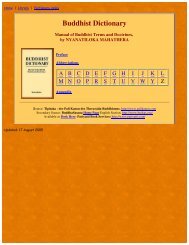With my respects to the Venerable Nyanatusita Thera
With my respects to the Venerable Nyanatusita Thera
With my respects to the Venerable Nyanatusita Thera
You also want an ePaper? Increase the reach of your titles
YUMPU automatically turns print PDFs into web optimized ePapers that Google loves.
Of <strong>the</strong> fifth and sixth centuries B.C., Rapson states that “at no period in early his<strong>to</strong>ry,probably, were <strong>the</strong> means of communication by land more open or <strong>the</strong> conditions morefavourable for <strong>the</strong> interchange of ideas between India and <strong>the</strong> West.” 13“This may account,” according <strong>to</strong> Rawlinson, “for <strong>the</strong> influence of Indian ideas upon <strong>the</strong>development of Greek philosophy.” 14“It is not <strong>to</strong>o much,” says R. Garbe, “<strong>to</strong> assume that <strong>the</strong> curious Greek (Pythagoras) whowas a contemporary of <strong>the</strong> Buddha, and, it may be, of Zoroaster, <strong>to</strong>o, would haveacquired a more or less exact knowledge of <strong>the</strong> East, in that intellectual age offermentation, through <strong>the</strong> medium of Persia. It must be remembered in this connectionthat <strong>the</strong> Asiatic Greeks, at <strong>the</strong> time when Pythagoras still dwelt in his Ionian home, wereunder <strong>the</strong> single sway of Cyrus, <strong>the</strong> founder of <strong>the</strong> Persian Empire.” 15“Herodotus, like Pla<strong>to</strong> and o<strong>the</strong>rs, attributes all wisdom <strong>to</strong> Egyptian sources … TheGreeks were deeply impressed by <strong>the</strong> great antiquity of Egyptian civilization, its loftytemples, and its closely guarded religious <strong>my</strong>steries … Unfortunately, it is extremelydoubtful whe<strong>the</strong>r <strong>the</strong> Egyptians did actually believe in transmigration … It is morelikely that Pythagoras was influenced by India (re transmigration) than by Egypt.Almost all <strong>the</strong> <strong>the</strong>ories—religious, philosophical and ma<strong>the</strong>matical—taught by <strong>the</strong>Pythagoreans were known in India in <strong>the</strong> sixth century B.C., and Pythagoreans, like <strong>the</strong>Jains and <strong>the</strong> Buddhists, refrained from <strong>the</strong> destruction of life …” 16“Alexandria in <strong>the</strong> first century A.D. was <strong>the</strong> second city in <strong>the</strong> Empire. In <strong>the</strong> height ofher glory, she must have resembled Venice in <strong>the</strong> full tide of her prosperity. Themercantile shipping of half <strong>the</strong> ancient world tied up at her quaysides, and scholarsfrom <strong>the</strong> four quarters of <strong>the</strong> earth met and disputed in <strong>the</strong> Museum and made use of<strong>the</strong> vast s<strong>to</strong>res of literature in her great libraries. The Alexandrians were essentiallycosmopolitan. They had none of <strong>the</strong> contempt for <strong>the</strong> 'barbarians' of <strong>the</strong> old Greekstates, and a large proportion of <strong>the</strong> population, like <strong>the</strong> A<strong>the</strong>nians, 'spent <strong>the</strong>ir life innothing else, but ei<strong>the</strong>r <strong>to</strong> tell or hear some new thing.' A Buddhist monk from Barygazawould receive <strong>the</strong> same attentive hearing as did St. Paul at <strong>the</strong> hands of <strong>the</strong> Areopagus,and <strong>the</strong> medium was Hellenistic Greek, lingua franca from <strong>the</strong> Levant <strong>to</strong> <strong>the</strong> Indus. TheMilindapañhá mentions Alexandria as one of <strong>the</strong> places <strong>to</strong> which Indian merchantsregularly resorted, and Dio Chrysos<strong>to</strong>m, lecturing <strong>to</strong> an Alexandrian audience in <strong>the</strong>reign of Trajan, says: 'I see among you, not only Greeks and Italians, Syrians, Libyans,and Cilicians, and men who dwell more remotely, Ethiopians and Arabs, but also13 Rapson, E.J. ed., Ancient India, The Cambridge His<strong>to</strong>ry of India, Volume 1, Cambridge, 1922, pp.87–8814 Rawlinson, H.G., “India in European Literature and Thought, " in The Legacy of India, by G. T.Garratt, The Clarendon Press, Oxford, 1937, p. 415 Ibid, note (Probably from The Philosophy of Ancient India, by Richard Garbe, The Open CourtPublishing Company, Chicago 1897)15 Rawlinson, op. cit., p. 56
















